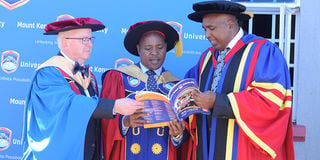EAC secretary general challenges more universities to expand across the region, like MKU
Sponsored by Mount Kenya University

From left: Mount Kenya University (MKU) Chancellor Prof John Struthers, East African Community Secretary General Dr Peter Mathuki, and MKU Chairman Prof Simon Gicharu, during the university’s 22nd graduation ceremony on December 9, 2022.
By Evans Ongwae
East African Community (EAC) secretary general, Dr Peter Mathuki, has urged universities to open branches across the region. Dr Mathuki said this on December 9 in Thika, where he was the guest speaker during Mount Kenya University’s (MKU) 22nd graduation ceremony. A total of 4,500 students graduated.
Massive market
The EAC chief executive pointed out that the recent entry of the Democratic Republic of Congo (DRC) into the block had expanded the market to about 300 million people.
Echoing the graduation theme (“Higher education as a factor for reduced inequalities”), he noted that developing the capacities of more East Africans would enable larger populations to explore the expanding opportunities in the region, and therefore reduce inequalities.
Greater access to higher education, he pointed out, would contribute significantly towards this goal.
Dr Mathuki accordingly lauded MKU and its founder and chairman, Prof Simon Gicharu, for making education accessible to many in region. This as he recognised MKU as East and Central Africa’s largest private university.
Dr Mathuki invited the university, which has a big footprint in the region, to also venture into other EAC member states of Tanzania and DRC, where it has no presence so far.
Prof Gicharu was of the same mind, revealing that in addition to Tanzania and DRC, MKU had plans to enter South Sudan, another EAC member.
UNAI Hub
Dr Mathuki congratulated MKU for having been bestowed by the United Nations the responsibility of serving as a UN Academic Impact (UNAI) Hub for SDG No. 10 on Reduced Inequalities, in 2018.
“This is an achievement that comes with a lot of responsibilities and expectations on what the university ought to institutionalise to achieve the mandate,” he pointed out.
MKU is one of the 17 universities in the world spearheading the achievement of the 17 SDGs under the UNAI initiative, which aligns institutions of higher education with the UN in supporting and contributing to the realisation of UN goals and mandates, including the promotion and protection of human rights, access to education, sustainability and conflict resolution.
MKU will serve in that capacity until 2024.
Said the EAC chief: “Looking through the events taking place across the world today, glaring inequalities are so evident. Universities are called to contribute towards ending these inequalities through their triple-mandate of teaching, research and community outreach.”
He called on all universities to create awareness about the 17 SDGs by 2030 “and ensure all university activities are directed towards the achievement of the SDGs”.
Dr Mathuki said he was aware that MKU had implemented programmes that supported all the SDGs, and in so doing, contributed quite well towards ending inequalities through capacity building in health sciences, education, ICT, engineering, energy production, gender, persons with disabilities (PWDs), and many others that contribute variously in the achievement of the SDGs by 2030.”
Strategic facilities
He added that universities needed to establish strategic facilities such as innovation and incubation hubs, entrepreneurial promotion facilities, dedicated university-based foundations, and gender desks, all of which should be fully utilised to support every university in achieving her mission and vision.
This, he pointed out, “will require strategic resource mobilisation to support nurturing of innovations into patents and their requisite commercialisation.”
Entrepreneurship
Dr Mathuki promised to pursue EAC’s recognition of MKU as a Centre of Excellence in promoting entrepreneurship within East Africa. MKU runs the Graduate Enterprise Academy (GEA), which trains entrepreneurial graduates willing to start enterprises.
The EAC secretary general further urged universities to support the entrepreneurial growth of students, staff and communities. “To achieve these milestones, deliberate efforts are required in creating synergies between the academia, private sector and governments,” Dr Mathuki told his audience at the MKU function.
In Kenya, MKU has eight regional campuses and six Open, Distance and e-Learning (ODeL) centres that enable thousands of people to access higher education at their convenience.
Regional footprint
MKU is one of the most culturally diverse universities operating in East Africa. The university’s main campus is located in Thika town, Kenya. Other campuses are in Nairobi central business district, Parklands, Mombasa, Nakuru, Eldoret, Meru, and in Kigali, Rwanda.
The university has ODeL centres in Malindi, Kisumu, Kitale, Kakamega, Kisii, and Kericho; and country offices in Kampala, Uganda, Bujumbura in Burundi, Hargeisa in Somaliland, and Garowe in Puntland.
For more information about the university, visit www.mku.ac.ke


